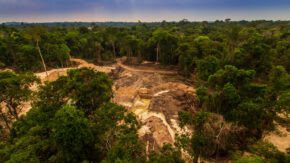WOBO emphasises the need for their members and fellow professionals to keep up to speed with developments linked to sustainability.

Nature degradation risks £1.5trn for UK, warns Tony Juniper
Natural England chairman Tony Juniper has accused policymakers of acting as if “oblivious” to the accelerating decline of key ecosystems, and implored the Government and private sector to urgently improve how they value nature.

Take our 10-minute survey on corporate sustainability trends
edie is calling on readers to take part in a short survey on sustainable business, with findings set to be used to provide a progress update on the state of corporate sustainability in all industries.
Registration open for edie’s carbon credits webinar
Registration is open for edie’s upcoming webinar exploring whether carbon credits can be used as a viable part of corporate net-zero strategies and how the market will shape up for those still waiting for more certainty.

Report: Global water security at risk with river levels lowest in three decades
New research from the World Meteorological Organisation (WMO) has revealed that 2023 was the driest year for global rivers in more than thirty years.
The findings are detailed in the ‘State of Global Water Resources’ report, which is designed to offer decision-makers critical insights into water resources, particularly for those working in water-sensitive sectors and disaster risk reduction.
The report is based on data collected from dozens of National Meteorological and Hydrological Services, alongside contributions from other organisations and experts.
The report indicates that river flows and reservoir inflows have recorded below-normal levels for the past five consecutive years. In 2023, more than 50% of global catchment areas showed abnormal conditions, with most exhibiting water deficits.

Financiers underestimating pollution risks of chemical investments, investors with $12trn warn
Investors including BNP Paribas Asset Management and Robeco are urging peers to more deeply consider the social, environmental and economic risks associated with investment in toxic chemicals.
The Investor Initiative on Hazardous Chemicals, an investor group with over $12 trillion under management or advice, has made the call to action after new research from investigative watchdog Chemsec revealed how chemical companies are managing risk.
In general, the research found, companies are not modernising their risk management approaches. Moreover, many have no plans to reduce and end the use of toxic materials and offer alternative solutions.

Energy giants collaborate to safeguard nature and communities during green transition
As the transition to renewable energy grows, the World Economic Forum has launched a new coalition assisting large developers in creating projects that benefit nature and local communities.
The transition to renewable energy is becoming increasingly vital to global sustainability efforts, as reports suggest renewable capacity must triple in the run-up to 2030 to keep global temperature rises under 1.5C. As more wind farms, solar plants and new grid networks are created, they will naturally interact with and have an impact on local communities worldwide.
The Responsible Renewables Infrastructure Coalition (RRIC) project, launched during Climate Week NYC, consists of stakeholders from both private leaders in energy and notable environmental organisations. Key partners include Birdlife International, The Nature Conservancy, Enel and Copenhagen Infrastructure Partners.

UK accused of lagging on nature protection ahead of UN biodiversity summit
The UK is not on track to meet its 2030 target of setting 30% of land and sea aside for nature, and has missed the deadline to submit new plans to the UN ahead of its next international biodiversity summit.
The accusation of the UK lagging in efforts to deliver the so-called 30×30 goal has this week been made by Wildlife and Countryside Link (WCL).
According to the NGO, just 9.7% of England’s seas are effectively protected for nature, up slightly from 8% last year. And the proportion stands at around 3% of land.
While a greater proportion of land and sea have specific classifications as protected or sites of interest, WCL has tracked little to no progress in real-world outcomes. Such sites may still face damage from agricultural or industrial activity and other risks include climate-induced extreme weather events and pollution.

£500k of electrolyser innovation funding confirmed as Scotland eyes hydrogen opportunities
The UK’s Net-Zero Technology Centre (NZTC) will allocate £500,000 to three innovative projects developing electrolysers this year, as part of efforts for the nation to lead in the global green hydrogen market.
At least 5GW of ‘green’ hydrogen production capacity should come online in the UK by 2030, if existing UK Government targets are met. Green hydrogen production involves running water through an electrolyser to separate the hydrogen molecules, in processes powered by renewable electricity.
The NZTC has today (3 October) announced the recipients of funding to develop next-generation electrolysers, as part of a competition intended to help scale the domestic supply chain and establish a strong export market.

EU delays mandate for businesses to eliminate supply chain deforestation
The implementation of the EU’s Regulation on Deforestation-free Products (EUDR) will be delayed, following lobbying from nations such as Indonesia and practical challenges progressing policies in an EU election year.

Businesses urge EU to criminalise ecocide and halt subsidies which damage nature
Patagonia, Natura and Tony’s Chocolonely are among a group of businesses urging the EU to set bolder climate and nature policies in what they describe as a “final decade for action”, regardless of lobbying for deregulation.
The businesses have penned an open letter to European Commission president Ursula von der Leyen setting out a vision for better policymaking for a green transition to a “fair and sustainable” economy.
Achieving this vision, they state, will require “upholding and strengthening” regulation and legislation, with no wiggle-room for delays and dilutions of policies relating to environmentally and socially responsible business.

IEA says European nations need to get clear on hydrogen demand plans – and quickly
The global pipeline of hydrogen production projects has doubled in the past year, but Europe risks losing out to Asia and the Middle East without clearer plans to stimulate demand for hydrogen from industry.
These are the headline findings of the International Energy Agency’s (IEA) new annual Global Hydrogen Review, published today (2 October).
The review concludes that there is “continued momentum” for bringing low-emission hydrogen production projects online, despite “persistent cost pressures” across the world, including in Europe, the US, China and the Middle East.
